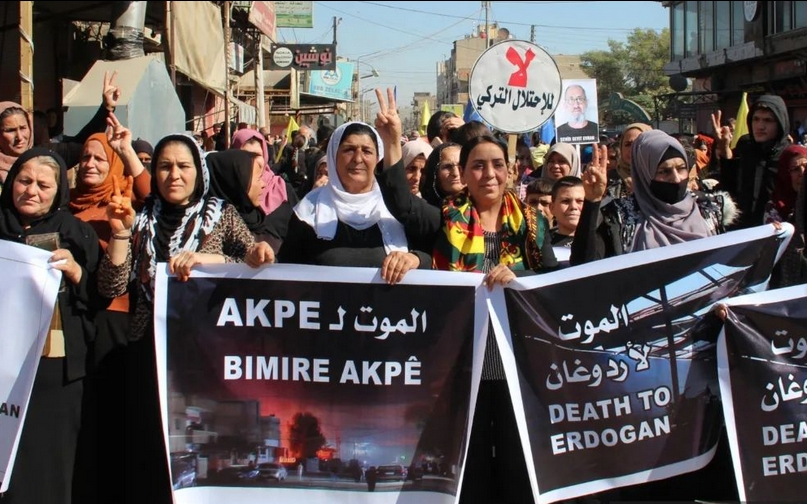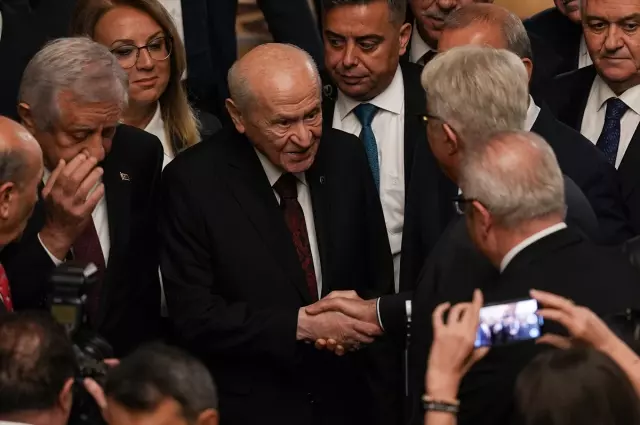
- Abdullah Öcalan, the imprisoned leader of the Kurdistan Workers’ Party (PKK), received the first visit from his nephew Ömer Öcalan. For almost four years he has been denied visits, phone calls and all communication with the outside world. Turkey, which in the last 25 years has been in a state of almost total isolation, has starred in a bloody war against the PKK, however.

The niece reported that Abdullah Öcalan was healthy, had given memories to everyone and conveyed the following message: "The isolation continues. If the conditions are adequate, I have the theoretical and practical capacity to bring this process from the sphere of conflict and violence to the juridical-political sphere".
In October it was news that the ultra-nationalist leader of the MHP party in Turkey, Devlet Bahçeli, has given a hand to the left DEM party. The fact that Bahçeli has decided to shake hands with his DEM colleagues has created confusion, not only among the Turks. The DEM has a political programme inspired by Öcalan, based on the self-determination of minorities, the emancipation of women and the democratisation of Turkey; and Bahçel has been calling out for its ban until recently.
President Erdogan’s support for Bahçeli’s symbolic Quintet aroused great suspicion. "Creating peace in our country is important at a time when conflicts are escalating in the Middle East," Erdogan said. This statement makes two clear points. On the one hand, Turkey is concerned about the following: Israel, backed by the United States, is attacking the Iranian representatives, and Turkey is concerned that the stir caused by it will not give the Kurds an opportunity to make political gains in Syria and Iran. On the other hand, it shows that Turkey needs to obtain the support of the large Kurdish constituency for the proposed constitutional changes, and that it has failed in its attempt to achieve a military solution.
It gives the impression that Turkey recalls the case of the Kurds only when it is in danger or when it sees new opportunities. Indeed, some analysts believe that Bahçeli’s handshake indicates that peace talks between the PKK and the Turkish Government have already begun.

The language of the Turkish Government is another one. Bahçel was convinced when he asked the DEM to "return to normal" and to "end terrorism" in Catalonia. He made it clear that he does not envisage a solution to the Kurdish problem if we are to negotiate "with terrorist organisations". He said that PKK fighters can only "go down the mountain and surrender". What is more, he asked Öcalan for the PKK to "dissolve unilaterally".
The PKK is going back to distant mountainous regions, particularly Iraqi Kurdistan. There, they have been persecuted by the Turkish forces in various military operations and have resulted in numerous victims and the death and displacement of Kurdish civilians. However, these operations have not succeeded in destroying the group’s organizational or operational capacity.
Attack on the PKK military drone producer
On 23 October there was an explosion and a shooting at the headquarters of the Turkish Aerospace Industry in Ankara, which has rocked the country. In the attack, perpetrated by one man and one woman, in addition to killing the two, another five people died and 22 were injured in various ways. The Turkish Government immediately blamed the PKK and its guerrillas, the People’s Defence Forces (HPG), announced two days after they took over the action. However, HPG noted that the attack was planned a long time ago and was not related to recent political developments in Turkey.

The HPG has made it clear that its aim was the Turkish Aerospace Industry, a prestigious manufacturer of military drones. The contrast is great, as the Turkish retaliation has taken place against civilians from the north and east of Syria. Turkey has intensified its air strikes in key areas of the Kurdish regions of northern and eastern Syria (DAANES) and in Sinjar, northern Iraq. These air strikes have resulted in critical infrastructures such as power plants, oil areas and food storage facilities, among others. In northeastern Syria, 1,031 attacks have left tens of thousands of civilians without electricity, fuel or basic services, and millions of people who were already facing the difficulties have approached human destruction. The Syrian Democratic Forces (FSDF) of the autonomous administration have accused Turkey of committing war crimes and, at the same time, have shown willingness to engage in dialogue.
Negotiator in Öcalan for the solution?
The Union of Kurdish Communities (KCK), a member of the PKK, has shared its concerns about Turkey’s honesty, building on its experiences in the negotiation process between 2013 and 2015. However, they pointed out that, through dialogue, they are seeking a democratic solution and stressed that the solution to the Kurdish problem and Turkish democratisation are united and that Öcalan is their interlocutor and negotiator. However, they stressed that "progress cannot be made until the isolation of Abdullah Öcalan has been definitively ruled out and its health, safety and working conditions guaranteed".

The recent events have undoubtedly created a climate of hope, after nine years in which Turkey has launched a bloody repression against the Kurds. It is not yet clear where this process will be heading, but there is one thing that is clear: the time for peace has already come. It is now up to the Turkish Government to demonstrate its willingness to find a political and fair solution to the situation of the Kurds. In the meantime, the Kurds and their international supporters are expected to call for Öcalan’s release and a political solution to the situation of the Kurds.
*Justus Johannsen, Middle East expert journalist